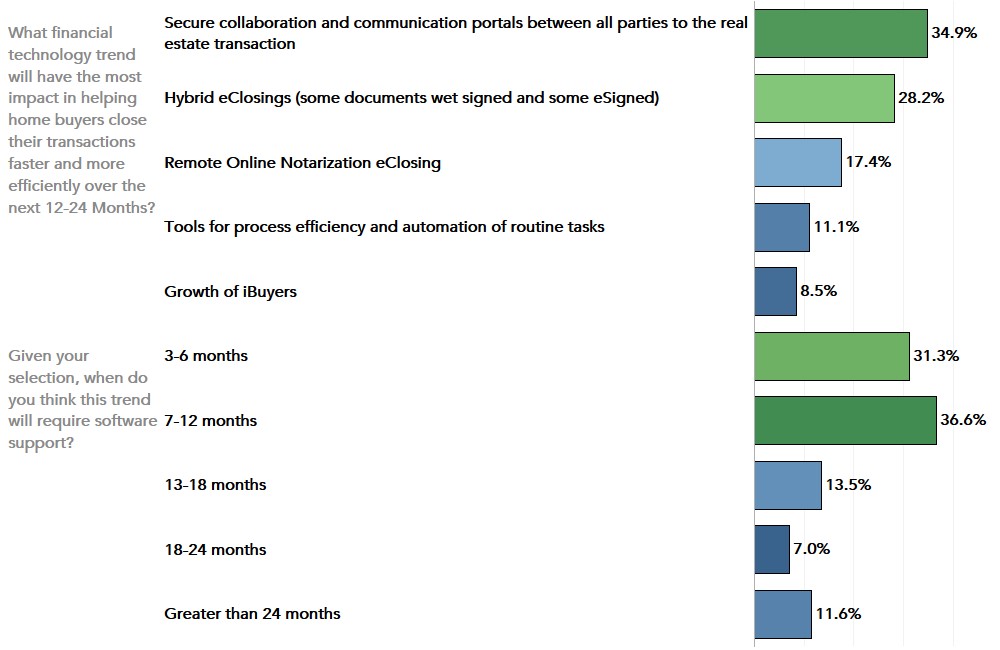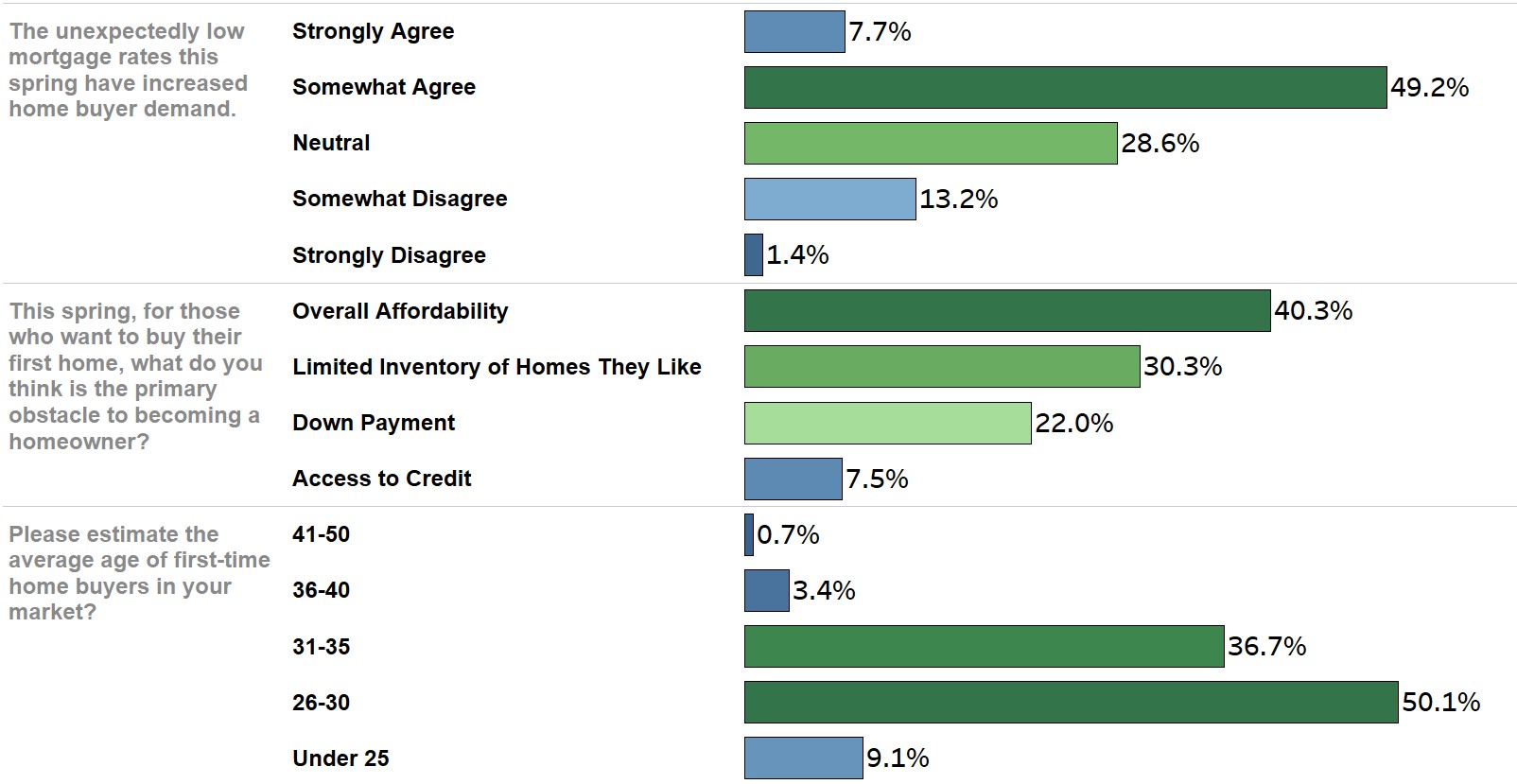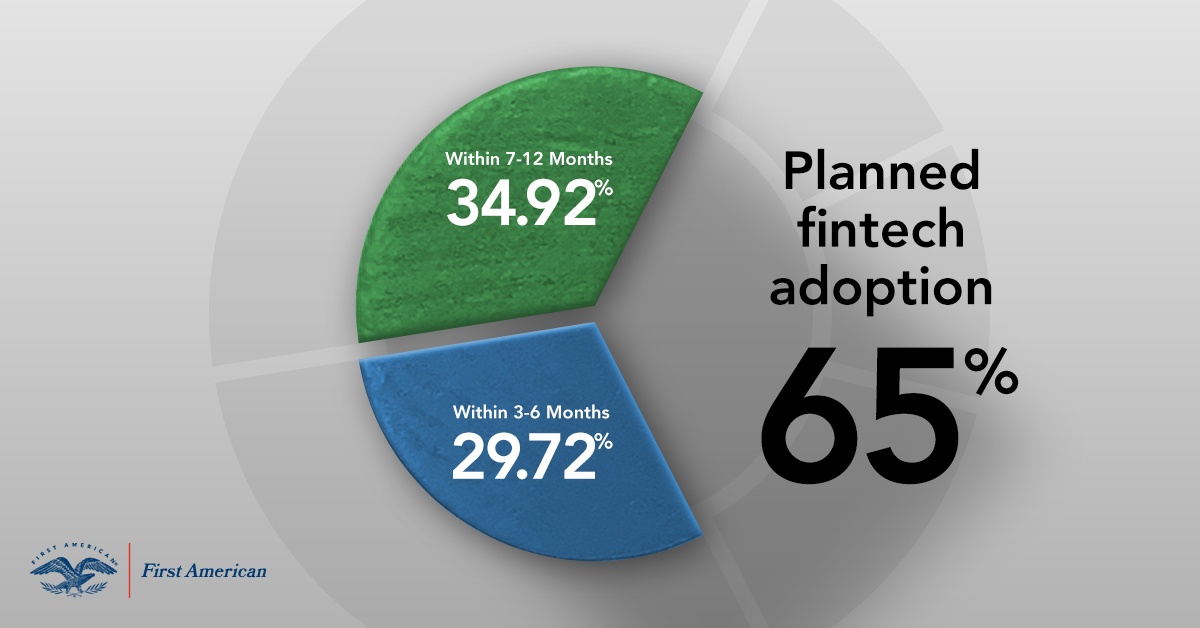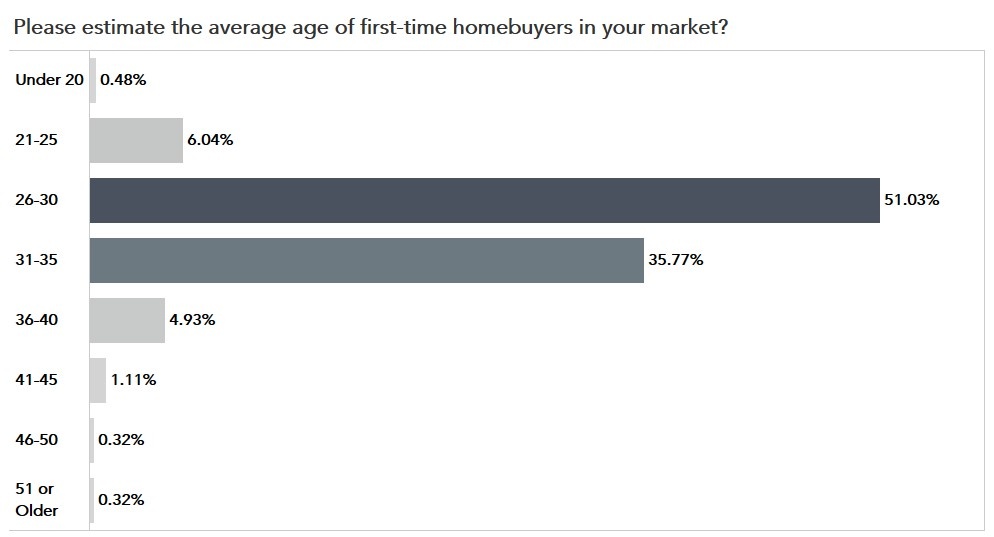The 2019 housing market turned out to be surprisingly strong, driven by a variety of favorable dynamics. Millennial-driven, first-time home buyer demand continued to rise, the economy reached its longest expansion in U.S. history in the third quarter of 2019, and rising wages pushed household incomes higher. Mortgage rates, which began their descent in December of 2018, continued to fall through September 2019, and have remained near historic lows since. In the second half of 2019, higher incomes and low mortgage rates increased home buying demand while supply remained tight, fueling faster house price appreciation.
"Title agents and real estate professionals believe demand for greater security and efficiency will be key drivers for greater fintech adoption in 2020."
Millennials, the largest group of prospective home buyers, expect greater efficiency and convenience in their home-buying experience. In the strong sellers’ market of 2019, the demand for greater efficiency accelerated as more home buyers felt pressure to settle deals quickly before opportunities fade away.
Given these trends and market forces, as part of our bi-annual First American Real Estate Sentiment Index (RESI), we recently surveyed title insurance agents and real estate professionals across the nation for their perspective on how financial technology (fintech) can improve the home-buying process.
Security Remains the Priority
In the fourth quarter of 2019, we asked title agents and real estate professionals the same question that we asked one year ago: what financial technology will have the most impact in helping home buyers close their transactions faster and more efficiently? One year ago, 45 percent of the title agents and real estate professionals surveyed agreed that the most important financial technology was secure collaboration and communication portals between all parties to the real estate transaction. This remained true in the fourth quarter of 2019, as 35 percent of respondents still considered secure collaboration and communication portals between all parties to the real estate transaction the most important.
One of the major trends affecting the real estate industry may explain why the 2018 and 2019 survey findings were consistent – the rise in wire fraud. Survey respondents indicated that buyers would benefit greatly from a secure platform that allows them to correspond with lenders, real estate agents, escrow officers, and other parties involved with the real estate transaction.
Moving from Wet-Signed Documents to a Paperless Real Estate Closing
A faster, more efficient closing process is very important to prospective home buyers. It’s unsurprising then that 28 percent of percent of title agents and real estate professionals surveyed believe that hybrid eClosings will have a large impact in helping home buyers close their transactions faster and more efficiently. Since many documents need to be signed in a real estate transaction, a hybrid eClosing means that many documents may be reviewed and eSigned in advance of the closing, while some documents must be wet signed in person. The benefits? A faster and more streamlined closing experience, and reduced risk of manual errors, just to name a few.
Similarly, 17 percent of title agents and real estate professionals surveyed believe that remote online notarization will have a large impact in helping home buyers close their transactions faster and more efficiently. Remote online notarization allows a notary to notarize documents remotely over the internet via tamper-evident digital tools, the latest fraud prevention technologies, and live audio-video conferencing. This technology already exists, and has been accepted as an alternative to traditional in-person notarization in several states.
Alexa, Find Me a Home
Another 11 percent of title agents and real estate professionals indicated that tools for process efficiency and the automation of routine tasks, such as customer service chat bots, would help deliver a more efficient home-buying experience. With techy savvy millennials looking to buy their first home, the concept of “responding too fast” does not exist. With more and more prospective home buyers searching for homes and information online, chat bots can help real estate agents engage with potential customers as they are browsing online listings at any time of the day. Additionally, chat bots and voice-based virtual assistants can help answer customer questions instantly, providing a more efficient home search process.
Are iBuyers Changing the Market?
Finally, 8.5 percent of title agents and real estate professionals believe that the growth of iBuyers is going to be the most important innovation that drives transactional efficiency for consumers. An iBuyer is a real estate company that enables homeowners and home buyers to quickly buy or sell a home, through the use of technology. iBuyers buy homes directly from the homeowners and sell them directly to home buyers, often without using a traditional real estate agent.
While the growth of iBuyers certainly offers a new way for people to buy and sell homes, the model represents a small share of the market compared to traditional brokerages. It may not be the technology to have the most impact on the housing market in the near term, but it is growing quickly and gaining importance in today’s sellers’ market.

Fintech Adoption Approaching Fast
Title agents and real estate professionals are aware that fintech can make real estate transactions faster and more accessible, and they are planning to adopt specific fintech in the near future. In fact, 67 percent of respondents intend to adopt these technologies in the next 12 months and nearly a third (31 percent) of title agents and real estate professionals will require software support in just 3-6 months.
Fintech applied to the real estate transaction can streamline time-consuming processes, increase security and improve the home-buying experience for potential home buyers. The fintech revolution is here, and it is here to stay in real estate.
Market Outlook Strengthens
In the fourth quarter of 2019, title agents and real estate professionals had a positive outlook for the overall purchase and refinance markets. For the purchase market, declining mortgage rates and a strong labor market powered an increase in house-buying power, and that likely contributed to the positive outlook. As for the refinance market, as might be anticipated, low mortgage rates significantly boosted the outlook for growth in refinance transactions compared with one year ago (when rates were rising) by over 120 percent. According to a recent study, approximately 6.8 million borrowers could benefit from refinancing, resulting in a sunny outlook for refis, as rates are expected to remain below four percent in 2020.
Title agents and real estate professionals are more optimistic about price appreciation growth now than they were at the end of 2018, with survey respondents expecting residential house prices to increase by 2.7 percent in the next year. With greater house-buying power driving more demand for homes in a market with limited homes available for sale, house price appreciation is likely to increase in 2020.
Fourth Quarter 2019 First American Real Estate Sentiment Index
- Overall, confidence in residential purchase volume growth over the next 12 months increased 38.4 percent compared with a year ago.
- Confidence in refinance transaction volume growth over the next 12 months increased 123.8 percent compared with a year ago.
- Residential property prices are expected to increase by 2.7 percent over the next 12 months.
- Residential price expectations are 0.5 percent higher than they were in in the fourth quarter of 2018.
"Overall, optimism among title agents and real estate professionals increased this quarter compared with one year ago. Continued economic growth and expectations that another year of low mortgage rates and further household income growth in 2020 will result in house-buying power gains for potential home buyers, gave survey respondents several reasons to have a more optimistic view of the purchase and refinance markets."
What do the RESI number values mean?
Title insurance agents and real estate professionals are experts in their local real estate markets and have valuable insight. First American’s proprietary Real Estate Sentiment Index is based on a quarterly survey of independent title agents and other real estate professionals, providing a unique gauge on the real estate market using the crowd-sourced wisdom and expertise of real estate experts.
Methodology
The First American Real Estate Sentiment Index (RESI) measures title agent sentiment on purchase and refinance transaction volume and price changes across multiple property types, as well as title agent sentiment on current industry issues. The RESI is calculated for each question as the sum of the positive responses minus the sum of the negative responses divided by two and times the total number of responses plus 50, resulting in an index that varies from 0 (all negative sentiment) to 50 (neutral sentiment) to 100 (all positive sentiment). A RESI value above 50 indicates increasingly positive sentiment and a RESI value below 50 indicates increasingly negative sentiment. Aggregated purchase and refinance sentiment indices are created by using a property-type, stock-weighted average of each underlying sentiment index.
The overall national sentiment index is a loan purpose market share-weighted average of the aggregate purchase and refinance sentiment indices. Aggregated national price expectations are property-type, state-stock weighted. Results are only reported when a sufficient number of survey responses are available to produce valid results.
Disclaimer
Opinions, estimates, forecasts and other views contained in this page are those of First American’s Chief Economist, do not necessarily represent the views of First American or its management, should not be construed as indicating First American’s business prospects or expected results, and are subject to change without notice. Although the First American Economics team attempts to provide reliable, useful information, it does not guarantee that the information is accurate, current or suitable for any particular purpose. © 2019 by First American. Information from this page may be used with proper attribution.
About First American
First American Financial Corporation (NYSE: FAF) is a leading provider of title insurance, settlement services and risk solutions for real estate transactions that traces its heritage back to 1889. First American also provides title plant management services; title and other real property records and images; valuation products and services; home warranty products; property and casualty insurance; banking, trust and wealth management services; and other related products and services. With total revenue of $5.7 billion in 2018, the company offers its products and services directly and through its agents throughout the United States and abroad. In 2019, First American was named to the Fortune 100 Best Companies to Work For® list for the fourth consecutive year. More information about the company can be found at www.firstam.com.



